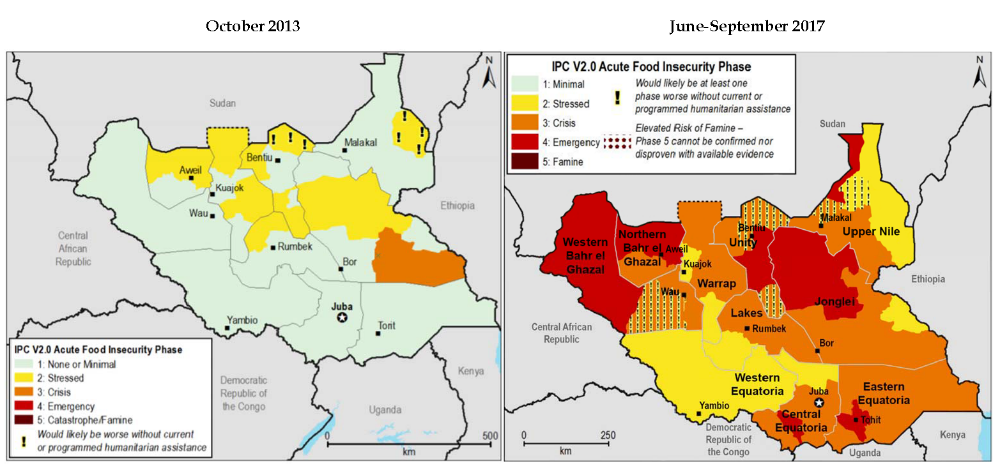 Click for PDF version
Click for PDF version
South Sudan is experiencing a humanitarian catastrophe that is nearly entirely a result of conflict, and the situation continues to deteriorate as the violence persists unabated. The number of acutely food insecure people increased from 5.5 million in May to 6 million in June—fully half of the population. In every state in the country, food insecurity is at either crisis or emergency levels. The situation on the ground may even be far worse as access to some of the most hard-hit areas is restricted. The conflict that erupted in December 2013 has killed tens of thousands of people. Countless more have died due to disease, malnutrition, and other factors attributable to the conflict. Four million people have been displaced, many more than once. In South Sudan, conflict and humanitarian need are inextricably linked:
- Conflict has stifled food production, contributing to historically high prices and hyperinflation. This will limit household access to food during September’s harvest. Nutrition and food security are expected to deteriorate further after that if the conflict does not abate. In Juba, a kilogram of sorghum costs 343 percent more than it did a year ago.
- The number of South Sudanese refugees increased by 1 million since June 2016, when intense fighting engulfed the Equatorias. Uganda is now home to 950,000 refugees. An estimated 2,000 refugees arrive there every day.
- Violence has cut off major trade routes. Markets in parts of Unity State and Western Bahr el Ghazal are believed to have exhausted their supplies.
- May was the first month in 2017 that the United Nations did not report the death of a relief worker. However, abductions continue, and fighting has forced the relocation of aid staff, disrupting assistance to South Sudan’s hardest-hit regions. Insecurity in Jonglei has resulted in the closure of a third of the state’s malnutrition treatment sites in recent months.
- South Sudan’s current cholera outbreak is the longest, most widespread, and deadliest outbreak in the country since its 2011 independence, with 5,000 cases reported since January. Insecurity has impeded aid groups’ ability to mount an adequate response.
Africa Center Experts
- Kate Almquist Knopf, Director
- Luka Kuol, Professor of Practice for Security Studies
Additional Resources
- Kate Almquist Knopf, “The Path to Justice in South Sudan,” Africa Center for Strategic Studies, Spotlight, July 1, 2017.
- Kate Almquist Knopf, “Salvaging South Sudan’s Sovereignty (and Ending Its Civil War),” Council on Foreign Relations, April 24, 2017.
- Kate Almquist Knopf, “Ending South Sudan’s Civil War,” Council on Foreign Relations, November 28, 2016.
- Africa Center for Strategic Studies, “UN Commission Calls for Investigation into South Sudan Violations,” Spotlight, March 1, 2016.
- Kate Almquist Knopf, “Fragility and State-Society Relations in South Sudan,” Africa Center for Strategic Studies, Research Paper No. 4, September 30, 2013.
- Kate Almquist Knopf, “South Sudan: Options in Crisis,” Congressional Testimony, September 21, 2016.
- Paul Nantulya, “Getting to the Root of the South Sudan Crisis,” Africa Center for Strategic Studies, Spotlight, August 1, 2016.
More on: Food Security South Sudan

